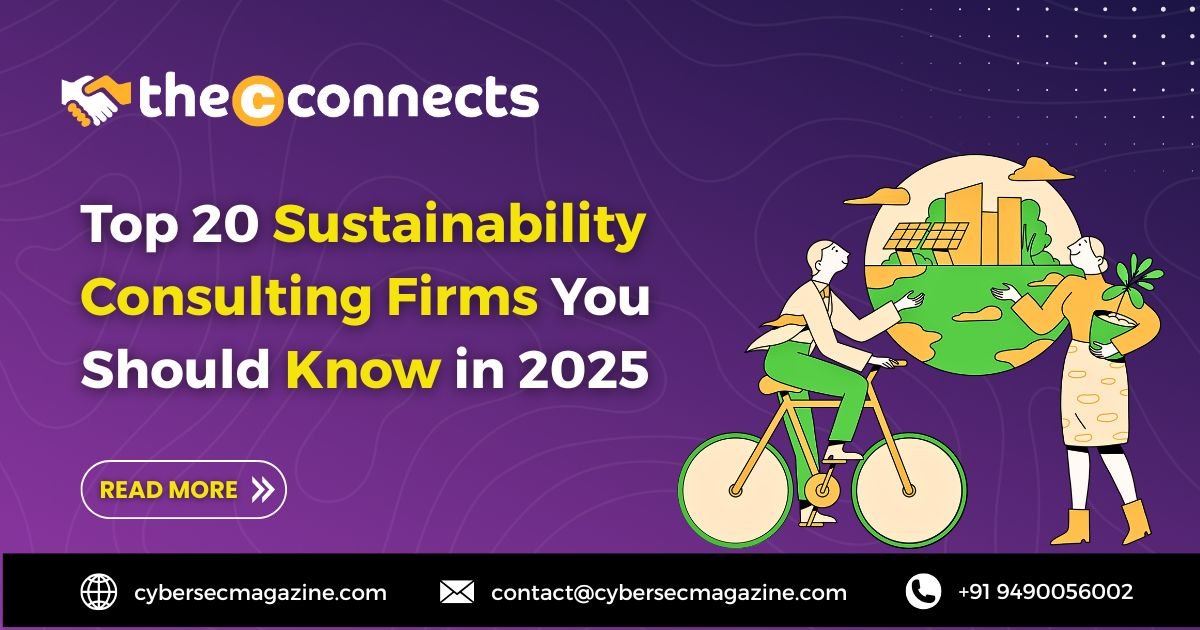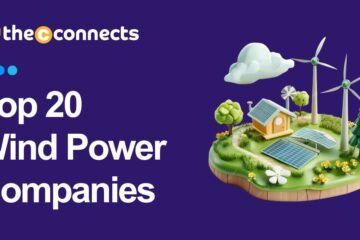Below is a market analyst style rundown of 20 consulting partners that are actually doing the work -decarbonization roadmaps, climate risk modeling, circularity strategy, ESG reporting, nature-positive design, and more. For each, you’ll get founder details, age of the firm, HQ, core offer categories, a concise positioning summary, and the standout features that differentiate them.
1. McKinsey Sustainability
Founders: James O. McKinsey
Founded Year: 1926
Headquarters: New York, United States (global firm with origins in Chicago)
Product Categories: Net-zero strategy, carbon abatement, circular business models, climate risk and resilience, sustainable operations, green venture building.
About the Company :
McKinsey Sustainability is the dedicated sustainability and climate practice inside McKinsey & Company, one of the original global strategy firms. The group’s pitch is simple: sustainability is now a growth engine, not just a compliance box. They help large enterprises cut emissions at scale, redesign value chains, launch low-carbon businesses, and turn regulatory pressure into new revenue streams. The firm leans on deep analytics, sector playbooks, and board-level influence to move sustainability from “pilot” to “operational reality.
Key Features:
- Decarbonization roadmaps tied to hard cost and margin impact, not just pledges.
- In-house “green business building” to incubate and scale new climate-positive ventures.
- Supply chain abatement programs focused on Scope 3 hotspots.
- Industry-specific transition models for energy, heavy industry, mobility, and consumer products.
- C-suite change management: governance, incentives, investor narrative.
2. Boston Consulting Group (BCG) – Climate & Sustainability
Founders: Bruce D. Henderson
Founded Year: 1963
Headquarters: Boston, Massachusetts, United States
Product Categories: Climate strategy, nature/biodiversity, sustainability-driven growth, ESG value creation, circularity, transition finance.
About the Company :
BCG’s Climate & Sustainability practice is built around the idea that climate action must create shareholder value. The firm partners with Fortune 500s, governments, and financial institutions to translate “net-zero by 2050” into near-term economics: capex allocation, portfolio shifts, new green revenue pools, and nature-positive supply chains. BCG also supports climate disclosure and impact measurement so boards can defend decisions to investors. Their hallmark is balancing ambition (“what the planet needs”) with pragmatism (“what operations can absorb next quarter”).
Key Features:
- Sector playbooks for heavy emitters (cement, steel, aviation).
- Nature and biodiversity strategy alongside carbon.
- Transition financing support for banks and PE.
- Operating model redesign for circularity, waste, and materials efficiency.
- Global public–private collaboration on climate policy impact.
3. Bain & Company – Sustainability & Corporate Responsibility
Founders: Bill Bain and colleagues from BCG
Founded Year: 1973
Headquarters: Boston, Massachusetts, United States
Product Categories: Net-zero and energy transition, sustainable supply chains, ESG due diligence in M&A, circular materials, sustainable food systems, DEI & social impact.
About the Company :
Bain’s sustainability team focuses on embedding ESG levers directly into the P&L. That means fixing Scope 1/2/3 emissions in procurement and logistics, baking sustainability into pricing and brand differentiation, and using ESG screens in deals and portfolio strategy. Bain positions itself as the “operators” of sustainability: less policy talk, more execution inside factories, sourcing, and distribution. The firm is especially strong in private equity ESG diligence and supply chain redesign for consumer, food, and industrial clients.
Key Features:
- Hard-nosed supply chain decarbonization and traceability.
- ESG in commercial and operational due diligence for PE.
- Circularity and materials innovation for packaging and consumer goods.
- Sustainability-driven commercial excellence (green premium strategy).
- Support for sustainable agriculture and regenerative food systems.
4. Accenture – Sustainability Services
Founders: Originated as Andersen Consulting; formalized 1989 (spin-out of Arthur Andersen)
Founded Year: 1989 as Andersen Consulting; rebranded Accenture in 2001
Headquarters: Dublin, Ireland
Product Categories: Net-zero transition, ESG data & reporting architecture, sustainable tech/cloud, value chain traceability, responsible AI/analytics, circular services.
About the Company :
Accenture Sustainability Services combines strategy consulting with systems integration. The value prop: help clients not only set 2040 climate targets but wire those targets into ERP, finance, procurement, and product lifecycle systems. They build carbon accounting platforms, design low-carbon operating models, and modernize energy usage with digital twins and AI. Accenture also publicizes its own net-zero roadmap and supplier decarbonization programs, using that credibility in the room with boards and regulators.
Key Features:
- End-to-end delivery: strategy → data platform → operating model.
- Net-zero execution, not just target-setting.
- ESG reporting automation integrated with finance and audit.
- Supplier decarbonization programs at scale.
- Industry depth in energy, telecom, consumer, and public services.
5. Deloitte – Sustainability & Climate
Founders: William Welch Deloitte
Founded Year: 1845
Headquarters: Deloitte operates as a global network; the international coordinating entity is headquartered in London, UK.
Product Categories: Climate risk & resilience, decarbonization strategy, ESG reporting and assurance, responsible supply chains, nature/biodiversity, sustainable finance.
About the Company :
Deloitte’s sustainability and climate teams sit at the intersection of strategy, reporting, and regulatory readiness. The firm helps clients quantify climate risk, comply with evolving disclosure rules, and channel capital toward decarbonization and nature-positive projects. Deloitte’s differentiator is scale: they plug sustainability into audit, tax, controls, and risk so boards can defend sustainability claims in front of regulators, investors, and rating agencies.
Key Features:
- Climate scenario modeling embedded into enterprise risk.
- Sustainability reporting and assurance aligned to global standards.
- Biodiversity and natural capital integration into strategy.
- Sustainable finance and green investment guidance.
- Global regulatory intelligence, including supply chain and human rights.
6. PwC – Sustainability & Climate Change
Founders: Formed from Price Waterhouse (Samuel Lowell Price et al.) and Coopers & Lybrand; merged as PwC in 1998.
Founded Year: 1998 (current form)
Headquarters: London, United Kingdom
Product Categories: ESG strategy, decarbonization programs, sustainable operations, capital projects and infrastructure resilience, circular economy advisory.
About the Company :
PwC’s sustainability practice positions climate as both risk and deal flow. They help clients embed ESG into core strategy, redesign operating models for low-carbon performance, and prepare credible transition plans that investors will actually fund. PwC has built a global network of thousands of sustainability specialists and is scaling climate capability across tax, deals, and supply chain. The result: sustainability and value creation are treated as the same conversation, not two separate workstreams.
Key Features:
- Enterprise-wide ESG operating model design.
- Decarbonization and circular operations, especially in heavy asset sectors.
- Climate risk baked into M&A and infrastructure planning.
- Cross-functional bench: tax, supply chain, deals, cyber, reporting.
- Large global delivery footprint for regulatory alignment.
7. EY – Climate Change and Sustainability Services (CCaSS)
Founders: Ernst & Young formed via merger of Ernst & Whinney and Arthur Young & Co. in 1989.
Founded Year: 1989 (current partnership structure)
Headquarters: London, United Kingdom (global HQ)
Product Categories: ESG disclosure and reporting, climate risk and opportunity assessment, biodiversity/nature risk, non-financial assurance, sustainable finance.
About the Company :
EY’s CCaSS practice is built for CFOs, audit committees, and sustainability leaders who are under pressure to quantify and report climate exposure. EY helps companies evaluate transition and physical climate risks, redesign governance, and communicate ESG performance with audit-grade rigor. The firm is also leaning into nature risk, biodiversity, and future green jobs -signaling that climate is no longer just about carbon, but also ecosystems and workforce transformation. EY publicly targets net zero itself and advises thousands of clients on sustainability strategy and disclosure.
Key Features:
- Audit-ready ESG and climate reporting.
- Nature and biodiversity risk assessment, not just carbon.
- Board governance and stakeholder reporting support.
- Integration of sustainability KPIs into finance and investor relations.
- Strong global delivery model across 150+ countries.
8. KPMG – Climate Change & Decarbonization
Founders: KPMG emerged in 1987 from the merger of Klynveld Main Goerdeler (KMG) and Peat Marwick.
Founded Year: 1987 (current global network)
Headquarters: Amstelveen, Netherlands (global HQ)
Product Categories: Climate risk and scenario analysis, decarbonization strategy, ESG disclosure assurance, supply chain sustainability, sustainable finance.
About the Company :
KPMG’s climate and decarbonization teams work like a hybrid of strategy consultants and risk auditors. They help clients identify climate exposure across operations and the supply chain, quantify the financial implications, and prioritize mitigation moves. KPMG is especially active in regulated sectors -energy, financial services, critical infrastructure -where climate risk is becoming part of core enterprise risk management. They also advise boards on how to meet emerging disclosure rules and investor expectations while protecting enterprise value.
Key Features:
- Climate scenario modeling tied to financial performance.
- Supply chain climate risk mapping.
- ESG and climate disclosure assurance.
- Sustainable finance, human rights, and responsible supply chains in one advisory stack.
- Global regulatory fluency across multiple jurisdictions.
9. ERM (Environmental Resources Management)
Founders: ERM’s roots trace to environmental consultancies formed in 1971 (UK) and 1977 (US), later merged in 1987 into ERM.
Founded Year: 1971 heritage / 1987 current structure
Headquarters: London, United Kingdom
Product Categories: Sustainability strategy, environmental & social impact, health & safety, climate transition, responsible supply chains, nature/biodiversity, ESG integration.
About the Company :
ERM bills itself as the world’s largest pure-play sustainability consultancy. They’re not a generalist strategy house with a sustainability arm -sustainability is the business. ERM blends board-level strategy (net-zero pathways, transition plans, ESG integration) with deep technical delivery in the field (EHS compliance, permitting, biodiversity management, social impact for large capital projects). That “strategy + boots-on-the-ground” model is why ERM is often on industrial decarbonization programs, mining critical minerals responsibly, or navigating complex stakeholder expectations around new energy infrastructure.
Key Features:
- End-to-end: boardroom strategy through on-site execution.
- Deep EHS/safety and social performance heritage.
- Strong presence in high-impact sectors (energy, mining, chemicals).
- Permitting and stakeholder engagement for major capital projects.
- Rapid-response teams for climate/ESG regulatory shifts.
10. WSP Global – Climate, Resilience & Sustainability
Founders: Originally Williams Sale Partnership (UK) in 1969; evolved via mergers into WSP Global.
Founded Year: 1969 heritage (Williams Sale Partnership); reorganized as WSP Global Inc. in 2014.
Headquarters: Montreal, Quebec, Canada
Product Categories: Climate resilience, ESG and sustainability strategy, environmental consulting, infrastructure decarbonization, nature-based solutions, adaptation planning.
About the Company :
WSP is one of the world’s largest engineering and professional services firms, with a major sustainability/ESG advisory practice focused on resilience and infrastructure. The firm helps cities, utilities, and asset owners future-proof assets against climate shocks, comply with ESG expectations, and design low-carbon, climate-resilient infrastructure. WSP’s differentiator is the fusion of strategic advisory (ESG, climate strategy) with deep technical design and permitting for large-scale infrastructure -especially in energy transition, transport, water, and the built environment.
Key Features:
- Climate resilience and adaptation planning for critical infrastructure.
- ESG strategy and disclosure support for utilities and public agencies.
- Engineering depth to actually build sustainable, low-carbon assets.
- Strong presence in energy transition projects (renewables, grid, hydrogen).
- Global footprint across 70k+ employees.
11. Arup
Founders: Sir Ove Arup
Founded Year: 1946
Headquarters: London, United Kingdom
Product Categories: Sustainable infrastructure design, low-carbon buildings, urban resilience, climate strategy for cities, circular materials/structures.
About the Company :
Arup is an independent, engineer-led consultancy known for iconic sustainable projects and a “total design” philosophy -integrating architecture, engineering, environmental performance, and social outcomes from day one. The firm works with governments, developers, and asset owners to design net-zero buildings, resilient transport systems, climate-ready water infrastructure, and nature-positive urban plans. Arup’s reputation comes from decades of solving “this can’t be built sustainably” problems and then actually building them.
Key Features:
- Net-zero building and infrastructure design baked in at concept stage.
- Climate resilience and adaptation planning for cities and transport.
- Circular construction materials and lifecycle carbon analysis.
- Social impact and equity embedded into infrastructure planning.
- Globally recognized for complex, high-profile sustainable design.
12. Ramboll
Founders: Børge Johannes Rambøll and Johan Georg Hannemann
Founded Year: 1945
Headquarters: Copenhagen, Denmark
Product Categories: Environment & health consulting, energy transition, sustainable infrastructure, water and climate adaptation, management consulting for ESG.
About the Company :
Ramboll is a Danish engineering, environment, and sustainability consultancy with deep Nordic roots in circular design and climate resilience. The firm advises on low-carbon energy systems, sustainable cities, water security, and environmental health. Unlike some pure strategy firms, Ramboll can go from climate ambition to engineered solution -district heating redesign, offshore wind infrastructure, flood adaptation, biodiversity planning. The company is majority-owned by the Ramboll Foundation, which keeps long-term sustainability (not just quarterly earnings) at the center of decision-making.
Key Features:
- Strong in renewable energy and energy systems planning.
- Water, coastal resilience, and climate adaptation expertise.
- ESG and sustainability advisory alongside engineering delivery.
- Foundation ownership aligns incentives with long-term sustainability.
- European regulatory and permitting depth.
13. Tetra Tech
Founders: Early engineering team including Nicholas Boratynski, Henri Hodara, Bernard LeMéhauté, and Don Stern
Founded Year: 1966
Headquarters: Pasadena, California, United States
Product Categories: Water management, environmental remediation, climate resilience, sustainable infrastructure, nature-based solutions, disaster recovery.
About the Company :
Tetra Tech brands itself “Leading with Science” -which is accurate. The firm built its reputation in complex water systems, environmental restoration, and resilient infrastructure, and now applies that technical depth to climate adaptation and sustainability. Tetra Tech helps governments, utilities, and corporates design reliable water systems, restore ecosystems, harden infrastructure against extreme weather, and meet environmental compliance. It’s especially strong in large public-sector and donor-funded programs where climate, infrastructure, and community impact intersect.
Key Features:
- World-class water and watershed engineering.
- Climate resilience and disaster recovery for public agencies.
- Nature-based infrastructure and habitat restoration.
- Environmental permitting and remediation for large capital projects.
- Integrated design–build–operate support for sustainable infrastructure.
14. Schneider Electric – Sustainability Business
Founders: Eugène Schneider and Adolphe Schneider (as Schneider & Cie)
Founded Year: 1836
Headquarters: Rueil-Malmaison, France
Product Categories: Energy and carbon management, decarbonization roadmaps, sustainability data and reporting, supply chain decarbonization, industrial electrification.
About the Company :
Schneider Electric is best known as a global leader in energy management and automation, but it has also built one of the most mature sustainability consulting businesses in the market. The team helps global manufacturers, data centers, and large multi-site enterprises measure, reduce, and report energy use and emissions -often tying strategy directly to building controls, electrification, and digital energy platforms. They’re especially strong in pragmatic decarbonization: where to electrify first, how to source renewables, and how to prove impact to investors and regulators.
Key Features:
- Carbon and energy management as an operational discipline, not a slide deck.
- Supplier decarbonization programs (Scope 3 enablement at scale).
- Electrification and automation roadmaps for industrial clients.
- Sustainability data, governance, and reporting integration.
- Proven experience with large, global asset footprints.
15. DNV
Founders: Established as Det Norske Veritas by a consortium of Norwegian marine insurers and shipowners in 1864.
Founded Year: 1864
Headquarters: Høvik, Norway (near Oslo)
Product Categories: Energy transition advisory, assurance and verification, ESG and sustainability performance, safety and risk management, low-carbon maritime/industrial strategy.
About the Company :
DNV is an independent assurance and risk management firm that grew out of maritime classification and now works across energy, heavy industry, and infrastructure. Its sustainability value prop: quantify risk, build trust, certify performance. DNV helps companies transition to renewables, manage safety and environmental risk, and prove sustainability claims to regulators, lenders, and insurers. The firm is widely used in emerging hydrogen, offshore wind, and grid modernization programs where technical credibility and third-party assurance really matter.
Key Features:
- Independent assurance of ESG and sustainability performance.
- Deep credibility in energy transition infrastructure (wind, hydrogen, grids).
- Advanced safety and risk engineering heritage.
- Scenario modeling for energy system transformation.
- Global presence across 100+ countries.
16. Guidehouse
Founders: Formed in 2018 when private equity firm Veritas Capital acquired PwC’s U.S. public sector consulting arm; later combined with Navigant Consulting (founded 1983).
Founded Year: 2018 (as Guidehouse brand)
Headquarters: Tysons / McLean, Virginia, United States (Greater Washington, D.C. area)
Product Categories: Decarbonization strategy for energy/utility clients, resilience and infrastructure planning, ESG and sustainability roadmaps for public sector and regulated industries, clean mobility/EV transition.
About the Company :
Guidehouse sits in a valuable niche: sustainability, energy transition, and resilience for highly regulated, politically visible sectors -utilities, government, infrastructure, defense, and critical industries. The firm blends strategic advisory with managed services and advanced analytics, helping clients electrify fleets, harden infrastructure against climate shocks, and design funding and implementation roadmaps for decarbonization. Guidehouse is also investing heavily in AI to scale transition planning, compliance, and operational resilience.
Key Features:
- Deep public-sector and regulated-industry credibility (energy, infrastructure, health, national security).
- Decarbonization and electrification planning for fleets and critical infrastructure.
- Community resilience and recovery funding strategies.
- ESG and climate programs that align with federal/state mandates.
- AI-enabled managed services to operationalize sustainability and compliance.
17. South Pole
Founders: Patrick Bürgi, Thomas Camerata, Renat Heuberger, Ingo Puhl, Christoph Sutter, Christoph Grobbel, Marco Hirsbrunner, Christian Dannecker
Founded Year: 2006
Headquarters: Zurich, Switzerland
Product Categories: Carbon credits and environmental certificates, net-zero target setting, climate risk advisory, value chain decarbonization, climate finance/project development.
About the Company :
South Pole is widely known for carbon markets and project-based climate finance. The firm helps corporates design net-zero strategies, measure and disclose climate risk, finance climate projects, and buy/sell high-quality carbon credits and environmental certificates. It operates one of the world’s largest portfolios of climate action projects. That said, South Pole and the broader offset market have faced scrutiny over credit integrity and impact claims -which has accelerated demand for more transparent methodologies and higher-quality credits.
Key Features:
- Strategy-to-execution support for corporate net-zero commitments.
- Access to global climate projects and carbon credit portfolios.
- Advisory on climate risk, disclosure, and value chain engagement.
- Finance and structure of nature-based and energy transition projects.
- Evolving focus on credit quality, monitoring, and governance.
18. Sphera
Founders: Formed in 2016 when Genstar Capital carved out the Operational Excellence & Risk Management assets from IHS Markit; led by CEO Paul Marushka.
Founded Year: 2016 (independent brand)
Headquarters: Chicago, Illinois, United States
Product Categories: Enterprise sustainability management (software + data), ESG reporting, EHS & safety management, product stewardship, supply chain transparency, climate/ESG consulting.
About the Company :
Sphera is positioned at the intersection of sustainability and operational risk. Think less “PowerPoint strategy,” more “data and software that auditors and regulators will accept.” The company provides ESG and EHS software, proprietary data, and consulting to help global manufacturers, industrials, and consumer brands measure emissions, prove compliance, assess product lifecycle impacts, and manage supply chain risk. Private equity ownership (Blackstone, plus recent growth investment) has fueled aggressive expansion, and Sphera is now viewed as a core digital infrastructure player for ESG reporting and sustainability performance.
Key Features:
- Integrated ESG/EHS software + expert advisory.
- Life Cycle Assessment (LCA) and product stewardship at SKU level.
- Supply chain transparency and Scope 3 data capture.
- Regulatory-grade reporting for climate, safety, and compliance.
- Scaling rapidly, with thousands of enterprise customers in 90+ countries.
19. Wood Mackenzie
Founders: Originated as Wood Mackenzie & Co., an Edinburgh stockbroker founded in 1923.
Founded Year: 1923
Headquarters: Edinburgh, Scotland, United Kingdom
Product Categories: Energy transition strategy, renewables market intelligence, carbon markets analytics, critical minerals and battery supply chain insights, sustainability benchmarking.
About the Company :
Wood Mackenzie (WoodMac) is a data-rich research and consulting firm focused on energy, resources, and the global energy transition. They advise utilities, investors, governments, and industrial players on renewables strategy, grid evolution, battery and critical mineral supply chains, hydrogen economics, CCUS, and decarbonization pathways. Unlike generalist consultancies, WoodMac leads with proprietary market data and techno-economic modeling. This makes them a go-to partner for board-level investment decisions in renewables, new fuels, and low-carbon infrastructure.
Key Features:
- Deep analytics on renewables economics, not just narratives.
- Long-view energy transition scenarios and pricing forecasts.
- Critical minerals and battery supply chain intelligence for EV and storage.
- Advisory for investors and infrastructure funds deploying billions into low-carbon assets.
- Integrated view of fossil-to-renewables strategy, including CCUS and hydrogen.
20. Bureau Veritas
Founders: Established in 1828 as a maritime inspection and classification bureau.
Founded Year: 1828
Headquarters: Neuilly-sur-Seine, France (Greater Paris)
Product Categories: Sustainability auditing & certification, supply chain ESG assurance, product compliance, responsible sourcing verification, health/safety and quality management.
About the Company :
Bureau Veritas is a global testing, inspection, and certification group now deeply embedded in sustainability. They work with manufacturers, infrastructure owners, and consumer brands to verify ESG claims, audit supplier sustainability performance, ensure product safety and environmental compliance, and certify operations against global sustainability standards. In plain terms: they give credibility. For companies under regulatory and investor scrutiny, Bureau Veritas provides the independent “stamp” that sustainability targets, sourcing practices, and climate disclosures are real.
Key Features:
- Independent ESG, sustainability, and supply chain audits.
- Certification of low-carbon operations and responsible sourcing.
- Product stewardship and compliance across complex global value chains.
- High credibility with regulators, investors, and NGOs.
- Global footprint in 140+ countries and 70k+ employees.
Final Takeaway
Sustainability consulting has matured from “write a CSR report” to “rebuild how the company runs, finances growth, and proves impact.” The firms above fall into two broad camps:
- Strategy + Transformation (McKinsey, BCG, Bain, Accenture, Big Four, Guidehouse):
These players help executives rewrite strategy, rewire operations, and sell the story to investors, regulators, and boards. - Technical + Assurance Specialists (ERM, WSP, Arup, Ramboll, Tetra Tech, Schneider Electric, DNV, Sphera, Wood Mackenzie, Bureau Veritas, South Pole):
These firms win when climate becomes physical: infrastructure resilience, environmental permitting, energy systems, credible data, verified claims.
If you’re selecting a partner, match your immediate pain point -compliance pressure, capital planning for transition, physical climate risk, Scope 3 decarbonization, ESG data infrastructure -to the firm that lives and breathes that exact pain. That’s how you avoid greenwash and actually move the needle.



